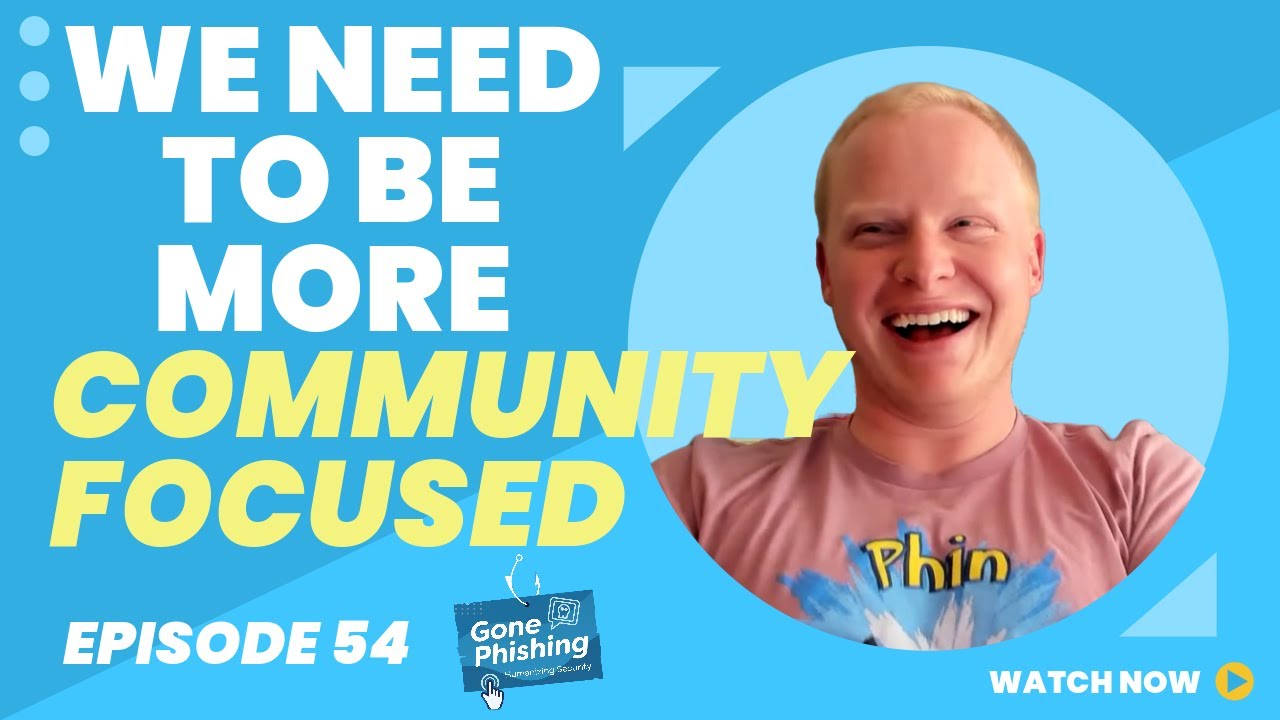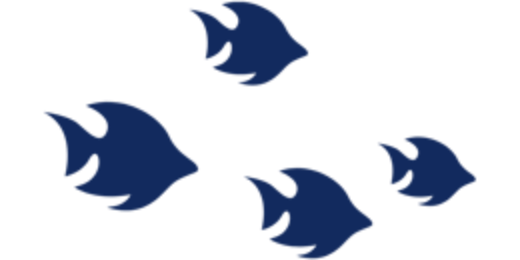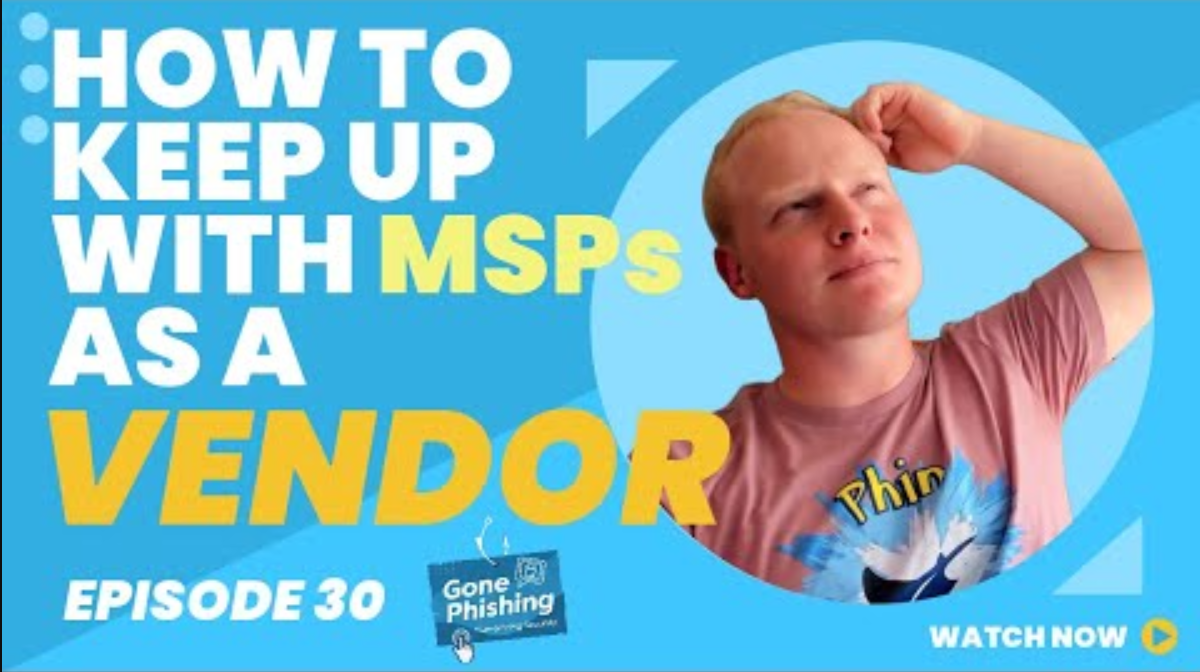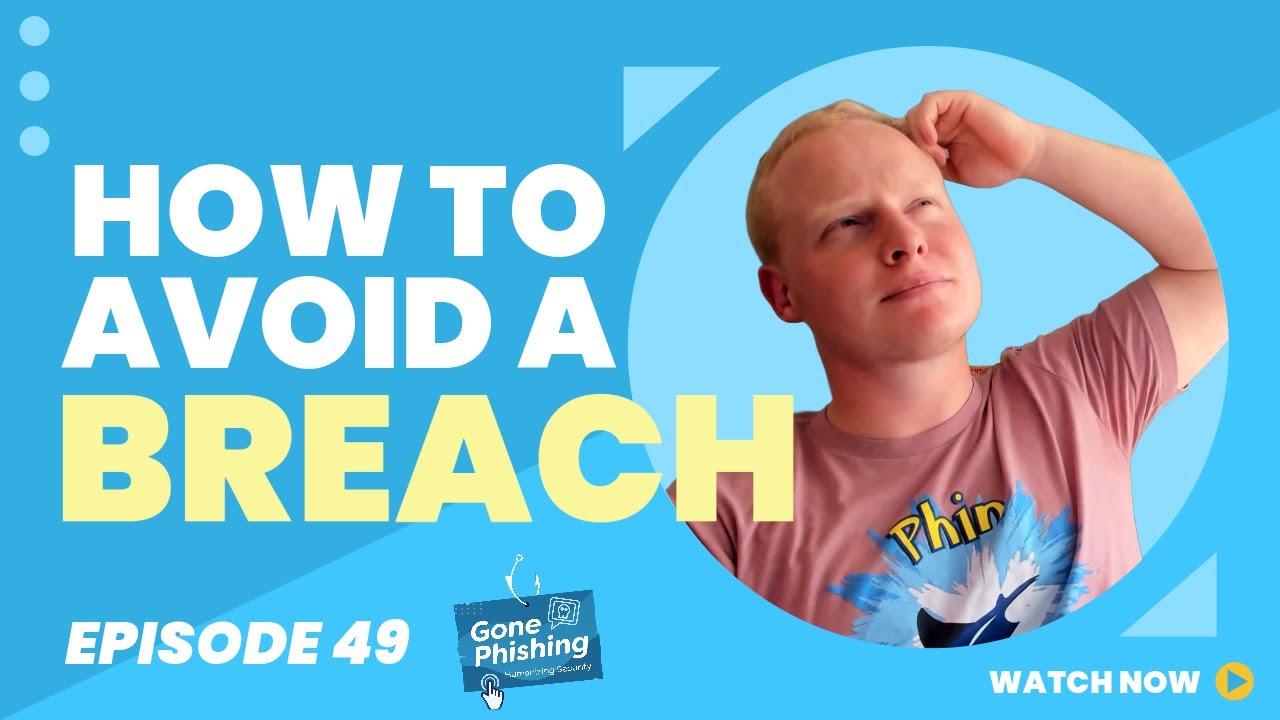


Connor Swalm
Welcome to Gone Phishing, a show diving into cybersecurity threats that surround our highly connected lives. Every human is different. Every person has unique vulnerabilities that expose them to potentially successful social engineering. On this show, we'll discuss human vulnerability and how it relates to unique individuals. I'm Connor Swalm, CEO of Phin Security, and welcome to gone phishing. Hey, everyone. Welcome back to another episode of Gone Phishing. I'm your host, Connor, CEO at Phin, and I am joined once again by Mary Signorelli, a director of partner experience, and I can confirm she is a very dope individual.
Mary, how are you doing today?
Mary Signorelli
Perfect, thank you.
Connor Swalm
So today we're going to talk about what it looks like to build a strong team. In our last episode, we chatted about not only have you worked in the channel for a bit, but you were a teacher. And my life is, for better or for worse, filled with teachers at all levels. My wife, my mom, my brother, my dad, grandma, grandpa, uncles, aunts, friends, everyone happens to be. Not me. I'm not a teacher. I don't have the patience.
Mary Signorelli
Not officially.
Connor Swalm
Not officially. I guess maybe I do teach people. I don't know some things all the time. I would never call myself a teacher. I'll put it that way. I don't have patience for that. So you've been a part of many teams. Not only are you one now, but teaching teams are a thing, as I've learned. What does it look like for you to build a strong team?
Mary Signorelli
I think that you've got to look at culture for sure. You've got to make sure that when you hire, when you interview, everything is directed at common goals, common values, and making sure that you've got a cultural fit because you can hire the smartest person and if they can't communicate with the team, they don't want to be a team player. I know the old saying is a bad apple spoils the bunch, but I've seen it happen. And, you know, you really have to be conscious of your team's needs and build a team that supports each other. I think it's just fundamental to the success of the organization to have a strong team.
Connor Swalm
Yeah, I think definitely you can set as many goals as you want as an organization, but there are these deeper drivers of what kind of person do you want to be? What kind of group of people do we want to be? How do we want people to perceive us? That unite you far greater than we're selling software to do x, Y, and Z ever will. What are some of the things that you think would united team. What are some of the pieces of culture that people should look to hire for?
Mary Signorelli
The teams that I've built in the past, one was around tech support and customer success. You really have to have people that are willing to put others before them. I think that's a huge thing. We talked about the shopping cart test doing the right thing because it's the right thing to do. You can have a quick sale and you can then have an unhappy customer, or you could build a relationship. You can't over promise and then under deliver. It's almost like you have to under promise and over deliver to make the experience good. And you have to have a team of people who are willing to do that. I strongly believe in surrounding yourself with people who are smarter in areas where you're not, so that you've got the competencies and all of that taken care of. But gosh, I think asking in the interview process questions about family, what do you like to do outside of work? Just the whole well rounded picture of the person is really important when building a team.
Connor Swalm
Yeah, I like to ask when's the last time you challenged somebody's beliefs and when's the last time you had your beliefs challenged? Because if you're not in regular scenarios where one, you're willing to put yourself out there in such a way that somebody's going to challenge your beliefs, but two, willing to give somebody else that opportunity for growth as well by challenging theirs and handling that respectfully is incredibly important because if everyone's just tiptoeing around each other and nobody wants to talk about where they agree or disagree, that leads to unmet expectations by everyone. Yeah.
Mary Signorelli
When I was a teacher, I've had I believe, eight student teachers who've come under me and taught them and helped them to grow as a teacher. And I told them we're going to have professional conversations and they're not meant to hurt your feelings, but you're here to grow and learn, and they're going to be difficult conversations, and I'm sure that tears will be shed and that's fine. But just know going in that you're not here to be my friend, I'm not here to be your friend. I'm here to help you. And so kind of setting that stage, even with employees, I think is super important that you're there to learn and growth is painful. You don't go to the gym and your muscles never burn, then you're never getting better. So same thing with learning and growth professionally. If you're not challenged, you're not learning.
Connor Swalm
That makes a lot of sense. So a lot of people feel this intuitively. A lot of people think about this all the time and would like to say, of course we hire for values and culture. But then I see a lot of companies, or you see evidence in the news or anywhere, really, or your friends talking about their own company or your family doing that, where it's clear a business missed something. They didn't build the teams properly, and there isn't a culture fit, and there aren't shared values. What do you think businesses miss? What do you think people miss most often that prevents them from building a team like that?
Mary Signorelli
I think that leaders who don't build diverse teams are really missing out on so many opportunities because your customers are diverse. You have to know I can speak about Phin. I think that when we came together as a team in Tampa, I've never seen more diverse people get along so well. And as I was sitting there just watching all the interactions, I was like the one word that came to mind was kindness is everybody is treated with kindness. And if I bring up something, maybe to the dev team or something, and I perceive it as a challenge, I've never been met with anything but a thank you. We didn't think of that. We didn't think that maybe it should go that way, but we see your point and just that open communication and kindness and treating people the way you want to be treated, it all sounds so old fashioned, but it's so important. And people who lose sight of that. Lose out on a lot of opportunities.
Connor Swalm
Yeah, they absolutely do. One thing that's been very true as we've built some of Finn together is that if it's not your number one focus, if it's not the only thing, one of the only things, I'll put it that way. I can't say only or all anymore. If it's not the most important thing you're focused on, then it'll fall by the wayside. Eventually, there will be a chink in the armor, so to speak, or somebody won't be quite aligned, or your company won't be quite aligned, or your team won't or something. Because it's incredibly hard to make sure everybody's still focused on having those values and treating everyone with kindness. Even something as simple as that, a lot of people lose sight of.
Mary Signorelli
Yeah, I think the more you think about it, maybe it's because as I've passed the 50 year mark, you think that those things are so simple. And, like, why don't more people get it?
Connor Swalm
Yeah, well, it's like losing weight is simple. Work out more than you or burn more calories than you put into your body. However, it's, in practice, an incredibly hard thing to do because you have to show up every day and be committed to doing that. Well, you can take days off, but more so than not, you have to be dedicated to doing that. You can misstep, but you can't misstep all the time or you move in a different direction.
Mary Signorelli
True. We love cooking way too much.
Connor Swalm
I love eating way too much, that's for sure. Thank God somebody loves cooking. I mean, I like cooking, but I'm more of a pragmatist when it comes to that. I'll cook a chicken thigh. I'm not going to slow roast prime rib for hours and hours. Like I said, I don't have patience for anything, so nothing like that. Where do you think people mess up on this most frequently? What steps should a company take if they're looking to build a team, whether that's a brand new one or maybe rebuilding an existing one from scratch?
Mary Signorelli
I think that if you're in that process, having a coach is huge. I had a coach, his name is Adam Petticourt out of Seattle, Washington, and helped really, for me, it was about I needed a sounding board that wasn't within the company to help me make sure that I was making the decisions for the right reasons and things like that. But I think that's huge is a lot of people think that they know everything, and there's so much I don't know. And I'm happy to admit that, but I think that having consultants, coaches, peer groups, things like that, and look at your team, do they all look the same? Do they all kind of think the same way? You need those diverse perspectives and things like that so that you can make the best decisions and help your customer. Yeah, well, and I think one thing that you really do need to look to is your interview process. Are you figuring out as much as you can about that person before you kind of bring them into the fold, if you will?
Connor Swalm
One thing I always hated about interview processes, not only ones that I was a part of, but when we had to start interviewing, when I had to start interviewing people, it's just like, of course, everyone knows how to interview. Well, like, you go online and you type in what are ten tips or ten strategies, ten things I should do to my cover letter, and you spend an hour looking on the Internet or watching YouTube videos, and all of a sudden, you know how to be a star candidate. And I always hated that because, sure, I knew I could go get the job. I just need to be whatever they're asking for. But that was not me. I wasn't myself. So then I thought the same thing when were interviewing. It's like, well, of course these people know exactly what to say and how to say it, because while they're just being what we're asking for, that's when I tried to come up with, what's a wacky question? What's a super question that, one, nobody could ever have answer prepared for. And two, they've never gotten in their life. It's like, all right, if I can do that, and it's valuable information, I think I'll get an honest answer. And that's when I ask, When's the last time you challenged somebody's beliefs? And my thought was, if somebody can't point to one in memory, any single, it could be a belief as, like, the best Pokemon starter. There's three that you get to choose from, and this is the best one. If you don't have enough of a sampling to pull from where you can't find one way you challenge somebody's beliefs. It's like, you're probably not going to do that here. And then, conversely, if you can't remember a single time when somebody challenged your beliefs, you're living a life that is so comfortable in regards to your thought and your actions and the motivations you have in life that you're probably not going to fare well when you are challenged because you're not used to it.
Mary Signorelli
Well, and I think I told you in hiring, like, a tier one tech and asking them where they want to go, what do you want to be doing in five years? And they're like, oh, I just want to be a tier one tech. Well, you're not the right person for this job. I want you to, like, tier one is, like, beginner. I want you to keep growing, and if an opportunity at this company doesn't open up for you, I would be happy to recommend that you go somewhere else if it was best for them.
Connor Swalm
Yeah. What is a bias that leads people to making poor hiring decisions? What's one that you could think off the top of your head if you don't have one? I know exactly which bias I want to talk about. Well, you go first, then I'll go first. I think a lot of people make the mistake of believing that people that are like themselves, whether that's the way they look, where they came from, the thoughts they have, the education they have, the amount of money they make. Just think of people that are like you. I think a lot of people who hire make the mistake that people that are like you are the people to get the job done.
Mary Signorelli
Yeah, that's a fatal mistake.
Connor Swalm
Right. Then it's like if you had left arms and right arms and you were trying to assemble them in such a way to get two arms on a body, it's like, well, if you only had left arms to work with, you don't have a right arm. It's like you're missing half the equation. In reality, decisions are much more complex than that. But that's how I've always viewed it as well. I suck at so many things. I regularly make the statement to Josh, I was like, you know, we're the only two unqualified people to work. Why? We wouldn't hire anyone that was remotely close to us as a result of we're not qualified to do any of this.
Mary Signorelli
So I think a big bias in the tech industry is that when I was growing up, everyone had to get a college degree. And if you don't have a college degree, then you don't get the interview. It's so different in this space. It's that people go learn what they want to learn. If they want to better at graphic design, they can go take some graphic design classes. They want to better at coding, they can take other certification classes. So I would say this might be discrimination against age, but I would think that the older you are, the more reverence you hold for, like a college degree.
Connor Swalm
Yeah, it definitely meant a lot more to have a college degree 30 years ago than it does now, for sure. And that with so many educational resources and if you're a self starter or if you're motivated in any way, shape or form, you can go on YouTube and at the end of three months, know more about a subject than most people who graduate college. Having studied that, how interested, how motivated, how excited are you about the thing that you're trying to understand?
Mary Signorelli
There's so much access to information now that wasn't there when I was growing up.
Connor Swalm
Yeah.
Mary Signorelli
To know that I've kind of been embraced by the young people and that I contribute. So my skill set is very different than your skill set and with other people on the team, and that's what makes a really good, functioning team.
Connor Swalm
Yeah. You have different people all pushing together in the same direction. Exactly. If you had one piece of advice for? Maybe somebody's a hiring manager. Maybe they're about to. I'm thinking of scenarios. They're about to hire their first person to work with them, ever. A tier one tech, let's say. What would your advice to them be?
Mary Signorelli
Listen to what they have to say.
Connor Swalm
Listen to what they have to say.
Mary Signorelli
Yeah, I think. What is it? We have two ears and one mouth for a reason. You should listen twice as much as you talk.
Connor Swalm
That's probably good. And that way, if you are not a very smart person, but you don't talk, nobody knows that. So it's like when I stop talking usually people can't tell that my ideas are dumb when I stop talking because I just haven't told them a lot. My piece of advice would be, always hire for the person, not for their skill set. So you can teach a motivated person to do anything. You can't teach a qualified person who doesn't want to do it. That's what I would say. That's what I've found so far.
Mary Signorelli
Yeah. I always told my students when they'd come back to me for college advice or anything, they didn't know what they wanted to do. I always told them to take communication classes because a business can't teach you to communicate. They can't teach you to public speak, but they can teach you the business.
Connor Swalm
Yeah. For those of you listening, I was reading an article today about Freshworks. Freshworks is like this multi billion dollar company that was based in Asia, sorry, that was based India. And they just did a presentation, the CEO just did a presentation where they took five key takeaways for why they are the best at what they do. Their second takeaway is focus on people who have a learning mindset and mapping their talent to whatever job they're doing. Don't hire for the people who are qualified. Hire for the people who have the mindset of the person you want. You can teach anyone anything as long as they want to learn.
Mary Signorelli
Great point.
Connor Swalm
Sweet. Well, thanks for joining us, Mary. It was a pleasure having you back on.
Mary Signorelli
Yeah, thank you. It was fun.
Connor Swalm
Once again, folks, I'm Connor, CEO at Phin, host of the Gone Phishing podcast. It's exactly what you've been listening to, in case you were wondering. So hope you have a great day and I will see you next time. Thanks so much for tuning in to Gone Phishin. If you want to find out more about high quality security awareness training campaigns, how to launch them in ways that actually engage employees to change their habits, then check us out. Phin Security at Phinsec IO. That's p h I n s e c IO or click all of the wonderful links in our show notes. Thanks for phishing with me today and we'll see you next time. Close.






